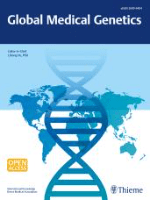
Global Medical Genetics
Scope & Guideline
Advancing the Future of Genetic Medicine
Introduction
Aims and Scopes
- Genetic Disorders and Disease Mechanisms:
The journal publishes research on various genetic disorders, elucidating their underlying mechanisms, including mutations, chromosomal abnormalities, and epigenetic modifications. - Genomic Medicine and Therapeutics:
Research focusing on the application of genomic knowledge in clinical settings, including gene therapy, precision medicine, and the development of targeted therapies for genetic conditions. - Innovations in Genetic Testing and Screening:
Studies that explore advancements in genetic testing methodologies, including next-generation sequencing, CRISPR technologies, and their implications for early diagnosis and management of diseases. - Cancer Genetics:
A significant focus on the genetic underpinnings of various cancers, including hereditary syndromes, somatic mutations, and the role of genetic factors in cancer susceptibility and treatment response. - Population Genetics and Epidemiology:
Research addressing the genetic diversity within populations, the prevalence of genetic disorders, and the impact of genetic factors on public health and disease management. - Bioinformatics and Computational Genetics:
Utilization of bioinformatics tools and computational methods to analyze genetic data, identify biomarkers, and understand complex genetic interactions.
Trending and Emerging
- Integration of Genomics and Artificial Intelligence:
Recent publications increasingly explore the use of AI and machine learning in analyzing genomic data, which enhances predictive modeling and personalized medicine approaches. - Role of Noncoding RNAs in Disease:
There is a growing body of research investigating the role of noncoding RNAs in various diseases, highlighting their potential as biomarkers and therapeutic targets. - Microbiome and Genetics:
Emerging studies focus on the interplay between the microbiome and genetic susceptibility to diseases, indicating a shift toward understanding holistic health through genetic and environmental interactions. - Longitudinal Studies on Genetic Variants:
An increase in longitudinal research examining the impact of genetic variants over time, particularly in chronic diseases, suggests a trend toward understanding the temporal dynamics of genetics in health outcomes. - Genetic Epidemiology of Infectious Diseases:
With the rise of global health concerns, there is an emerging focus on the genetic epidemiology of infectious diseases, particularly in the context of COVID-19 and its variants.
Declining or Waning
- Traditional Genetic Counseling:
There has been a noticeable decline in articles solely focused on traditional genetic counseling practices, possibly due to the integration of genetic services into broader healthcare frameworks and the rise of digital health solutions. - Single Gene Disorders:
Research specifically targeting single gene disorders has decreased as the field shifts toward more complex genetic interactions and polygenic risk factors, reflecting a broader understanding of disease etiology. - Aging and Genetic Factors:
Articles examining the genetic aspects of aging and age-related diseases have become less frequent, suggesting a potential waning interest in this area compared to more immediate genetic health concerns. - Animal Models in Genetic Research:
The use of animal models for studying genetic disorders appears to be declining, possibly as a result of advancements in in vitro and computational modeling techniques that provide alternative approaches to genetic research.
Similar Journals

Human Genetics and Genomics Advances
Shaping the Future of Genomic MedicineHuman Genetics and Genomics Advances is a premier academic journal published by Elsevier, dedicated to the field of human genetics and genomic medicine. With an ISSN of 2666-2477, this journal has quickly established itself as a leading platform for disseminating cutting-edge research from its inception in 2020. Featured prominently in Q1 categories for both Clinical Genetics and Molecular Medicine as of 2023, it ranks favorably among its peers, reflected in its Scopus rankings. The journal not only offers valuable insights into the latest advancements and applications in genetics but also facilitates open dialogue among researchers, clinicians, and students. As an open access publication, it ensures that groundbreaking findings in genetics are readily accessible to a global audience, promoting knowledge sharing and collaboration. Human Genetics and Genomics Advances continues to be instrumental in moving the field forward, providing a vital resource for those at the forefront of genetic and genomic research.

Genetics Research
Illuminating the Path of Genetic UnderstandingGenetics Research, published by HINDAWI LTD, is a distinguished open access journal that has been at the forefront of genetic studies since its inception in 1960. With the transition to open access in 2019, this journal has expanded its accessibility, fostering knowledge dissemination across the global scientific community. Operating out of the United Kingdom, it provides a platform for innovative research in the fields of genetics and molecular biology, encompassing a broad range of topics that are highly relevant to medical sciences. As of 2023, it holds a Q4 classification in Genetics and a Q3 classification in miscellaneous Medicine, reflecting its ongoing commitment to scholarly excellence amidst shifting academic landscapes. While the journal's H-index remains unlisted, its indexed ranking within Scopus, with a rank of #325/328 in the Genetics category highlights the challenges ligated to its niche audience. Nevertheless, it serves as a crucial resource for researchers, professionals, and students eager to contribute to and stay informed on the latest genetic research trends and breakthroughs.

Annual Review of Genomics and Human Genetics
Synthesis of Knowledge: The Pinnacle of Genomic ResearchAnnual Review of Genomics and Human Genetics, published by ANNUAL REVIEWS, represents a pivotal platform in the field of Genetics and Molecular Biology. With an impressive impact factor reflecting its high citation rate and scholarly influence, this journal is renowned for its authoritative reviews that synthesize current research across genomics and human genetics. Highlighting its Q1 category rankings in both Genetics and Clinical Genetics, as well as its ranking within the top tiers of Biochemistry and Genetics, the journal stands out as a leading resource for researchers, professionals, and students eager to stay abreast of groundbreaking developments in these rapidly evolving fields. While not currently an open access journal, its rigorous peer-review process ensures the highest standards of scientific integrity. Researchers can access comprehensive reviews that delve into both fundamental genetics concepts and cutting-edge discoveries, making it an essential resource for advancing understanding in human genetics and its applications.

G3-Genes Genomes Genetics
Fostering Innovation in Clinical GeneticsG3-Genes Genomes Genetics is a prominent open access journal published by Oxford University Press, Inc., dedicated to advancing the field of genetics and genomics. Since its inception in 2011, the journal has become a vital resource for researchers, professionals, and students, featuring high-quality, peer-reviewed articles that cover a broad spectrum of topics within genetics, including clinical genetics and molecular biology. With an impressive standing reflected in its 2023 Scopus rankings, which positions it in the Q2 category for Genetics (Clinical) and Q1 for Medicine (Miscellaneous), G3 remains at the forefront of scholarly communication in these disciplines. The journal's commitment to open access ensures that cutting-edge research is accessible to a global audience, stimulating collaboration and innovation in the field. For those eager to explore the latest in genetic research, G3 serves as an indispensable platform, inviting contributions that push the boundaries of scientific understanding.

JOURNAL OF GENE MEDICINE
Connecting Researchers to Transformative Genetic InsightsThe Journal of Gene Medicine, published by Wiley, stands as a pivotal resource in the field of gene therapy and molecular medicine, with a rich history of dissemination of impactful research since its inception in 1998. With an ISSN of 1099-498X and an E-ISSN of 1521-2254, this esteemed journal plays a crucial role in advancing our understanding of genetics and drug discovery, reflected in its impressive 2023 Scopus rankings where it holds a Q2 classification in Drug Discovery and Q3 in several genetics-related categories. The journal aims to facilitate the exchange of high-quality research findings that bridge the gap between laboratory and clinical applications, making it an essential platform for researchers, academics, and healthcare professionals committed to the forefront of genetic innovation. Although it does not currently offer open access options, its reputation for rigorous peer review ensures that all published work meets the highest academic standards, providing a reliable reference for scientific inquiry in the United States and beyond. As the field rapidly evolves, the Journal of Gene Medicine remains at the helm, guiding future discoveries with its influential publications and comprehensive insights.

Application of Clinical Genetics
Pioneering Discoveries in Personalized MedicineApplication of Clinical Genetics is a premier open-access journal published by Dove Medical Press Ltd., dedicated to advancing the field of clinical genetics since its inception in 2008. Based in New Zealand, this journal has established itself as a significant resource for researchers, clinicians, and students alike, contributing to the body of knowledge in both genetic medicine and clinical applications. With an impact factor reflecting its contributions to the field, the journal holds positions in the Q2 and Q3 quartiles of the 2023 Genetics categories, showcasing its relevance and scientific merit. Furthermore, it ranks #43 out of 99 in Clinical Genetics and #153 out of 347 in Biochemistry, Genetics, and Molecular Biology, indicating robust performance amongst its peers. The journal’s broad scope, encompassing various aspects of clinical genetics, ensures that it remains at the forefront of critical discussions, innovative research, and applications essential for the progression of personalized medicine. Researchers and professionals are encouraged to explore its openly accessible content that fosters collaboration and the sharing of knowledge in this dynamic and rapidly evolving field.

Cold Spring Harbor Perspectives in Medicine
Illuminating the Path of Medical DiscoveryCold Spring Harbor Perspectives in Medicine is a premier academic journal published by the esteemed COLD SPRING HARBOR LAB PRESS that has become a crucial resource in the fields of Biochemistry, Genetics, and Medicine. With an impressive impact factor and consistently ranked in the Q1 quartile for both biochemistry and general medicine—as evidenced by its Scopus rankings of #21 and #26 respectively—this journal serves as an essential platform for disseminating high-quality research and comprehensive reviews from leading experts. Covering a convergence of knowledge spanning from 2011 through 2024, it plays a vital role in advancing the understanding of medical science. Researchers, professionals, and students alike benefit from Cold Spring Harbor Perspectives in Medicine, which offers a depth of insight into critical topics, emerging trends, and essential developments within the medical community. Join the conversation and contribute to the ongoing dialogue that drives innovation and excellence in medical research.

ANIMAL GENETICS
Advancing the Frontiers of Animal GeneticsANIMAL GENETICS, published by WILEY, is a leading journal in the fields of Animal Science and Zoology, with a commendable Q1 classification for 2023, reflecting its critical role in advancing research and knowledge in animal genetics. Established in 1986, this journal has become a cornerstone for professionals, researchers, and students alike, providing a platform for innovative research that explores the genetic underpinnings of animal biology. With an ISSN of 0268-9146 and an E-ISSN of 1365-2052, it boasts a significant impact in both agricultural and biological sciences, as indicated by its ranking of #74 out of 490 in its category on Scopus, positioning it in the 85th percentile for Animal Science and Zoology. Readers can access high-quality, peer-reviewed articles that not only illuminate current advancements but also foster future research directions. While currently not an open access journal, ANIMAL GENETICS remains vital for anyone engaged in the exploration of genetics and its applications in medicine and beyond, with a continual commitment to publishing findings that shape the future of animal breeding, conservation, and genetics research.

TRENDS IN GENETICS
Pioneering Insights in the World of GeneticsTRENDS IN GENETICS, published by CELL PRESS, is a leading journal in the field of genetics, recognized for its significant impact on research and advancements in the discipline. With an impressive Scopus ranking of #10 out of 347 in the category of Genetics and a 97th percentile ranking, this journal stands as a premier platform for publishing innovative, high-quality articles that shape the future of genetic research. Since its inception in 1985, TRENDS IN GENETICS has been at the forefront of the genetic sciences, continuously disseminating crucial findings while maintaining a strong commitment to scientific rigor and integrity. Although it does not currently offer open access options, its rigorous peer-review process ensures that only the most relevant and groundbreaking studies make it to publication. Scholars and practitioners in genetics will find this journal to be an invaluable resource for keeping abreast of the latest developments, trends, and methodologies that drive the field forward.

GENOME RESEARCH
Navigating the Complexities of Genomic DiscoveriesGenome Research, published by Cold Spring Harbor Laboratory Press, stands as a premier journal in the field of genetics, featuring rigorous peer-reviewed research that explores the complexities of genome organization and function. With an impressive Q1 ranking in both Genetics and Clinical Genetics according to the 2023 category quartiles, this journal effectively bridges the gap between fundamental genetic science and its clinical applications. Its significance is further highlighted by its Scopus rankings, where it ranks #6 out of 99 in Clinical Genetics and #27 out of 347 in Biochemistry, Genetics, and Molecular Biology, showcasing its broad influence and access to cutting-edge discoveries. Researchers and professionals can look forward to a diverse array of articles that cover genomic technologies, bioinformatics, and translational genomics. Although not currently open access, the wealth of information available in each issue makes it an invaluable resource for anyone engaged in genetic research and applications.